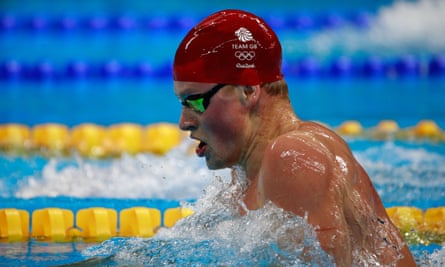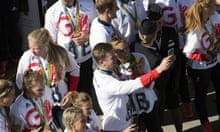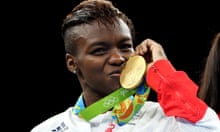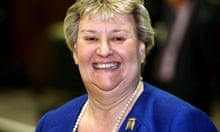It started on a Sunday, two weeks and half a lifetime ago. Adam Peaty in the pool. Two dry days, then came Joe Clarke in his canoe, Jack Laugher and Chris Mears together in the springboard diving. Flowing on, the men’s team sprint. And then the flood. Three one day, the women’s coxless pair, the men’s coxless four, and the men’s team pursuit. Three more the next, the men’s eight and the women’s team pursuit and Mo Farah’s first. A full five on the middle Sunday, success coming in such a giddy rush now it was a struggle to keep up. Max Whitlock and Andy Murray, Jason Kenny and Justin Rose. On Monday, more. Charlotte Dujardin, Giles Scott then Laura Trott. Kenny again. And on. Alistair Brownlee. Saskia Clark and Hannah Mills. Jade Jones, Nick Skelton, the women’s hockey team. Liam Heath. Nicola Adams. One last of all, one more for Mo.
Twenty-seven golds, all told, and 23 silvers and 17 bronzes. Sixty-seven medals altogether, the most Great Britain have won at an Olympics since the 1908 Games, surpassing even London 2012, and putting Great Britain ahead of China in the final medals table. It was only 20 years ago the team came back from Atlanta with a single gold medal between them, belonging to the coxless pair of Matthew Pinsent and Steve Redgrave. Everything else Great Britain did at those Olympics was silver or bronze or another hard luck story. This wave started building soon afterwards, when John Major decided to start channelling funds from the national lottery into elite sport. It seemed to reach a peak at London 2012 but has rolled on fast for another four years. “Where was that legacy?” Sebastian Coe said, through a grin, when he was asked on Saturday night about Team GB’s success.
“We have talked a lot about legacy and one of the things I was absolutely sure we wanted to make happen was that this wasn’t just about participation,” Lord Coe continued. “It was about inspiring a new generation to want to do what they have seen Chris Hoy and Victoria Pendleton do in London, and we have seen that happen across a range of sports.” There is some truth in that but not nearly so much as there is in the straightforward fact that the more you invest in your athletes and their training, the better they will do. The way UK Sport has been working it, in what it calls the “no-compromise approach”, the better they do, the more investment they will get.
So as investment has grown, from £60m before Sydney in 2000, to just under £280m for Rio 16 years later, Great Britain have climbed the medal table, from 36th in Atlanta, to 10th in Sydney and again in Athens, fourth in Beijing, third in London and, finally, second here. However, success doesn’t always become the British and before these Olympics were even over we had started to second-guess ourselves. The Guardian’s Simon Jenkins wondered whether spending money on elite sport was a sin somehow akin to doping. Janet Street-Porter asked why, after all this investment, the number of British people participating in sport had actually fallen since 2012. One is a better question than the other. This system works and that should be celebrated. But we need to ask how to best ensure that all this amounts to something more than a handful of happy athletes and two weeks of good TV for the rest of us.
In all the excitement, you may have missed Mel Marshall during these Olympics. Marshall, 34, is the head coach at the City of Derby Swimming Club, where Peaty is her star pupil. She is one of the thousands of people whose hard and often thankless work behind the scenes has played such an important part in Great Britain’s success at these Games. When Peaty won that first gold medal with his record-breaking swim in the 100m breaststroke, Marshall came down from the stands to talk to the press and take a quick turn in the spotlight. Happy as she was for Peaty, some of what she said was a lot more sobering than anyone wanted to hear in the first rush of his victory.

“We have had a very difficult year because we have lost facilities and all that kind of stuff,” Marshall said. “We’ve had some difficulties in terms of pools closing and all that kind of stuff.” How many? “All of them. We have lost three pools this year.”
In February, Derby city council announced that it was going to shut Moorways pool to save the £350,000 it costs to run it. Another, at Queen’s leisure centre, was also closed because it had become so decrepit the ceiling was at risk of falling in. The council eventually agreed to use £450,000 from their risk reserves to repair it. And, after campaigners gathered a petition with 4,000 signatures, they also committed to keeping Moorways open for another 12 months.
“That’s the background noise you just have to try to deal with,” Marshall said. She explained that in the circumstances she felt she had little choice but to invest the time and resources she had into training Peaty. “You just have to put all your eggs in one basket and still try and deliver the goods.”
This isn’t just happening in Derby. In the past three years, 17 leisure centres have either been threatened with closure or already been closed in Cornwall, so have nine in Birmingham, eight in Edinburgh and five in Shropshire. Local council cuts mean that sport and leisure facilities are suffering in every county in the country. The trade union Unison estimates that £71m was cut from leisure centre budgets between 2010 and 2013.
Coe says the legacy of London 2012 “wasn’t just about participation” but “inspiring a generation”. However, the two things are inextricably linked. It it true that Peaty, for one, made a resolution to compete in Rio after he watched his friend Craig Benson swim at the London Olympics. Peaty, however, was already an elite swimmer and, despite Coe’s claim, the measure of London’s success isn’t just how well our twentysomethings are competing now but how well our younger athletes do in a decade’s time. There is little point inspiring them to play sport if they have no place left to go and do it. The government has realised this and recently pledged to give an extra £150m of funding to primary schools between now and 2020. There is much, much more still to be done.
There isn’t actually all that much gold in a gold medal. At these Games, they have been made mostly out of silver recycled from mirrors and x-ray plates, and then gold-plated. Which means they are worth around £450. A silver costs half as much and a bronze almost nothing at all. Britain, if you divide the amount UK Sport invested by the number of medals the team won, spent more than £4m on each of them. Only a cynic would object because it is not the price of the medal that matters so much as the value.
But to extract that, we need to start investing as much time, energy, money and effort in the grassroots of our sport as we do the elite men and women who compete at the Olympics.








Comments (…)
Sign in or create your Guardian account to join the discussion